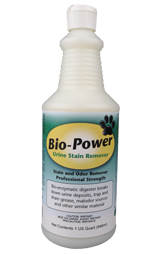Bio-Enzymatic Cleaners and Green Cleaning
Bio-enzymatic cleaners are products that use non-pathogenic, “good” bacteria to clean, deodorize, and consume wastes and malodors. The bacteria in these cleaners break down soils into two basic components: carbon dioxide and water. For this reason, many bio-enzymatic cleaners are considered to be environmentally friendly and “green” compared to many other cleaners. Numerous bio-enzymatic cleaners are even green-certified.
Even if a bio-enzymatic cleaner is not green-certified, it can still be considered environmentally friendly and be a good complement to a green cleaning program. Bio-enzymatic cleaners are considered “green” for various reasons:
1. They perform well, as the bacteria can penetrate into small cracks and crevices and eliminate wastes and odors that other chemicals often cannot remove.
2. They are environmentally friendly, as the bacteria consume soils and convert them into carbon dioxide and water, and they are readily biodegradable.
3. They are safe for human health. They use non-pathogenic, harmless bacteria rather than chemicals that can sometimes be corrosive to skin and eyes. The non-pathogenic bacteria can also help to displace disease-causing bacteria, further benefiting human health.
4. They are cost effective. Some bio-enzymatic cleaners can keep working up to 80 hours after application, continually consuming soils and odors, ensuring they are eliminated.
It is important to note that although many bio-enzymatic cleaners are green and environmentally friendly, not all are. Depending on the other components of the product (surfactants, dyes, fragrances), the cleaner may not be biodegradable or environmentally friendly. Be sure to check the label and with the manufacturer to ensure the product is considered green or green-certified.
Bio-enzymatic cleaners can be used as surface cleaners, odor eliminators, carpet spotters, and more. Multi-Clean offers several bio-enzymatic cleaners, including our brand new Tri-Fecta, a surface cleaner with the cleaning and deodorizing power of bacteria.
For more information on how bio-enzymatic cleaners work, be sure to check out our blog post: Bio-Enzymatic Cleaners: How Do They Work?












